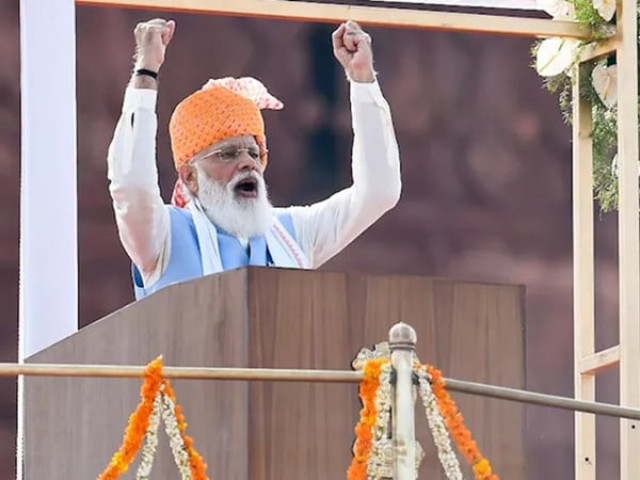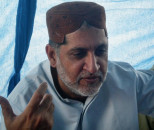Pakistan slams Modi for claiming Kashmir issue 'resolved'
FO urges India to deliver on commitments to people of IIOJK, refrain from making "delusional statements"

Islamabad on Tuesday “categorically rejected” Indian Prime Minister Narendra Modi's remarks about Indian Illegally Occupied Jammu and Kashmir (IIOJK).
At a public rally in Gujarat ahead of the state assembly elections due at the end of the year, Modi claimed that he had somehow “resolved the Kashmir issue”.
According to Indian media reports, Modi said that he was walking in the footsteps of India's first home minister Sardar Patel, claiming that “Sardar saheb persuaded all the princely states to merge with India. But another person handled this one issue of Kashmir,” in an apparent jab at India's first PM Jawaharlal Nehru.
Read Pakistan reiterates stand on Kashmir
“As I am following in the footsteps of Sardar saheb, I have values of the land of Sardar and that was the reason I resolved the problem of Kashmir and paid true tributes to Sardar Patel,” Modi reportedly said.
The unwarranted remarks drew criticism from the Foreign Office (FO), which in a statement termed them as “not only false and misleading but also reflects how oblivious the Indian leadership has become of the ground realities in IIOJK”.
🔊: PR NO. 4️⃣8️⃣8️⃣/2️⃣0️⃣2️⃣2️⃣
— Spokesperson 🇵🇰 MoFA (@ForeignOfficePk) October 11, 2022
Pakistan rejects Indian Prime Minister’s remarks about Indian Illegally Occupied Jammu & Kashmir (IIOJK) during a public rally in Gujarat State
🔗⬇️https://t.co/ShZzMvo9Cx pic.twitter.com/77vDjekHNE
“Jammu and Kashmir is an internationally recognized dispute, the resolution of which has been on the agenda of the United Nations since 1948. Despite clear UN resolutions that prescribe a free and impartial plebiscite for the final disposition of the dispute, India has not only illegally occupied the territory but is also guilty of egregious human rights violations employing over 900,000 brutal occupation forces,” the statement issued by the FO read.
Read More Overseas Kashmiris laud Pakistan for UN statement
It also added that the fact remains that the people of IIOJK continue to brave India’s reprehensible occupation which it seeks to perpetuate through malicious demographic changes and strong-arm tactics. The craftily staged visits of the Indian leadership to the occupied territory and choreographed launches of so-called development projects in a bid to create a façade of ‘normalcy’ will neither dampen the spirit of the Kashmiris struggling to break free from the illegal Indian occupation nor would it deceive the world into believing India’s deception.
The FO urged the Indian leadership to “deliver on their commitments to the Kashmiris and to the world and ensure that the people of Kashmir are accorded their inalienable right to self-determination” instead of “making delusional statements about having resolved the dispute unilaterally”.
“Pakistan has consistently called upon the international community to assume its role and responsibility with regards to IIOJK and the ongoing Indian atrocities in the occupied territory. India must also be held responsible for its nefarious scheme of altering the demography of IIOJK, as well as for its brutal repression of the innocent Kashmiris,” the statement added.
Reiterating its calls to human rights and humanitarian organisations to “condemn India’s state-terrorism in IIOJK and demand an immediate reversal of the Indian government’s illegal and unilateral actions of 5 August 2019”, Pakistan said that “the only solution to the Jammu and Kashmir dispute lies in ensuring that the Kashmiris are allowed to exercise their right of self-determination through the democratic method of holding an UN-mandated free and impartial plebiscite as espoused in the relevant UNSC resolutions and as per the wishes of the Kashmiri people.”
Also Read India replicating Israeli model in Kashmir: speakers
Earlier in September, Amnesty International had sounded alarms over intensified repression of rights in IIOJK in the last three years, saying it had recorded at least 60 instances of crackdowns on journalists and human rights defenders since the revocation of the special status of the region in August 2019.
In a report titled “We are being punished by the law: Three years since the abrogation of Article 370 in Jammu & Kashmir”, Amnesty documented interrogations, travel bans and detentions of journalists and human rights defenders.
The human rights watchdog had observed that in recent years, civil society members, journalists, lawyers and human rights defenders in the region had faced relentless interrogations, arbitrary travel bans, revolving door detentions and repressive media policies.



















COMMENTS
Comments are moderated and generally will be posted if they are on-topic and not abusive.
For more information, please see our Comments FAQ